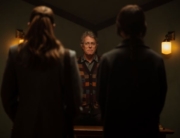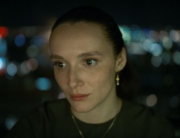Ellie Foumbi’s visually striking feature debut lit up the festival circuit, earning multiple nominations and wins. After premiering at the Venice Film Festival in 2021, the film won this year an audience award at the Tribeca Festival and a nomination for Best Feature at the Independent Spirit Awards.
This gripping tale is set in a quiet town in the South of France, where Marie, an African refugee, works as the head chef at a retirement home. She lives a simple life. Marie cares for the residents, spends time with friends, and frequents a nearby bar. However, when a Catholic priest arrives at her workplace to give a sermon, Marie recognizes him from her past life in Guinea. She remembers him as the brutal warlord who killed her family and turned her into a child soldier in his army. Unable to suppress her memories from the present, Marie takes revenge and punishes the man who has terrorized her dreams for decades. Though she is put in a position where the hunted becomes the hunter, can she take the life of the warlord who has caused her so much trauma? Or will she choose to forgive him and consequently forgive herself? This dramatic exploration of trauma is further amplified by the stories of child soldiers that inspired the film’s backstory, according to a Variety interview with the director.
Foumbi opts to convey her story visually, emphasizing the cinematography over the dialogue. Cinematographer Tinx Chan carefully curates each shot to create tension and uncertainty with long uninterrupted takes that create a sense of unnerving friction between Marie and Father Patrick (Souleymane Sy Savané). During the first half, Foumbi creates a sense of doubt regarding Marie and Father Patrick’s relationship. Something is clearly puzzling, but Foumbi only hints at that while escalating the suspense. This is perfectly in line with the horror and thriller genres. It also opens up many narrative possibilities, but Foumbi chooses to take a somewhat predictable route that diffuses the underlining conflict. Foumbi changes her focus to Marie’s internal strife as she tries to resolve her trauma while (romantically) developing her future with a bartender.
In some ways, the result feels like a spiritual successor to Beasts of No Nation, which depicts the brutal life of child soldiers. Subsequently, Our Father, The Devil focuses on their plight while trying to reestablish their lives. At its core, the film is about healing and how difficult that journey can be. Much of the movie’s success must be attributed to the powerful presence of Babetida Sadjo as Marie. Jennifer Tchiakpe also delivers an endearing performance as Nadia, Marie’s best friend.







Leave A Comment